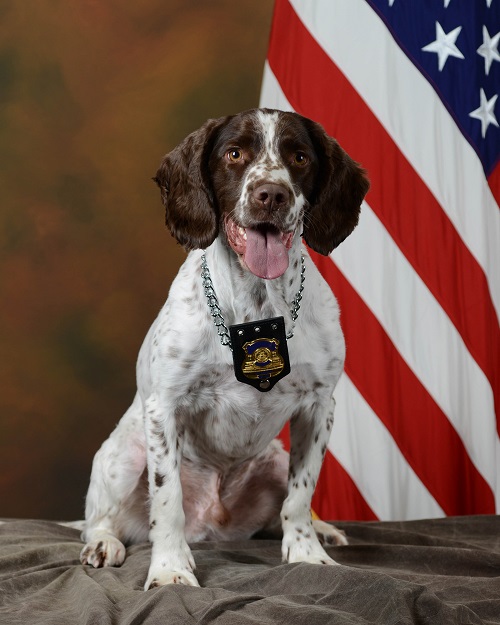Sunny is a very friendly Springer Spaniel who loves attention and affection.
But if you were to see Sunny on the street or in a crowd, you might not realize he is one of the few dogs in the world trained to detect person-borne explosives.
The Department of Homeland Security (DHS) Science and Technology Directorate (S&T) Detection Canine Program partnered with the Pentagon Force Protection Agency (PFPA) to assist in developing a training initiative to add person-borne improvised explosive device (PBIED) detection capabilities to their canine teams.

Traditionally, dogs sniff out “left-behind” bombs, but Sunny and the other members of his K-9 unit are also trained to pick up explosive scents on a person or any moving target.
“I started a PBIED program before I retired from the Maryland State Police with the help from DHS S&T,” said Major Scott A. Wayne, Commander of the Special Operations Branch.
“Once I arrived at this police agency, I knew what my first project would be.”
“Our current PBIED Program has not only given us this valuable capability, it has also made my Explosive Detector Dog (EDD) Program better than before.”
“DHS has updated techniques and methods used by our EDD handlers.”

DHS S&T performed operational readiness tests that provided real world training scenarios, said Wayne.
Those tests made handlers more cognizant of their surroundings and identifying their canine’s change of behavior.
The K9 Unit has evolved and grown extensively since implementing the DHS PBIED Program.
PFPA started their third class in August with four more PBIED teams.
The canine teams (dog and handler) were trained by subject matter experts (SMEs) from Johns Hopkins University’s Applied Physics Laboratory, which is contracted by S&T, and will join a cadre of highly proficient teams in the National Capitol Region that S&T assesses as part of their research program.
The SMEs not only trained new dogs, but worked with a few “traditionally” trained dogs as well.

“Canines are the best, most versatile mobile detection tool we have to protect the homeland,” said Don Roberts, S&T Explosives Division’s (EXD) Program Manager.
EXD is part of S&T’s Homeland Security Advanced Research projects Agency.
“The growing threat of PBIEDs has led to the need for explosives detection canine teams to develop person-search capabilities.”
“By working with PFPA to bring this type of detection capability into their mission space, we are also gathering statistically significant evidence to help drive policy and investment decisions for DHS and the first responder community.”
Corporal Kyle Murdock, Sunny’s handler, said dogs like Sunny can scan up to 200 people per minute simply by tracing an odor to its original source, even in crowds as large the 2016 Marine Corps Marathon or the 2017 Rolling Thunder event.
(To improve training for explosives detection, DHS S&T EXD develops low-cost, non-hazardous training aids that can be used to improve and test canine ability to detect new threats. EXD has conducted behavior analysis on canine teams, both dog and handler, to enhance and validate testing methods. Courtesy of DHS S&T and YouTube)
“Detection canine teams are a good physical deterrent at Pentagon events,” says Murdock.
“Having PBIED detection capability is just one more way we are securing the Pentagon.”
One of the goals of the S&T partnership with PFPA is to work together in research and development activities to improve the proficiency of explosive detection canine teams.
In the future, Murdock hopes the dogs will be able to detect explosives on a dynamic target.
Applying the findings from ongoing research will strengthen PBIED capabilities for canine teams deployed in force protection roles.
Learn More…
S&T Helps Explosive Detection Canine Teams get REDDI (See Video)

















